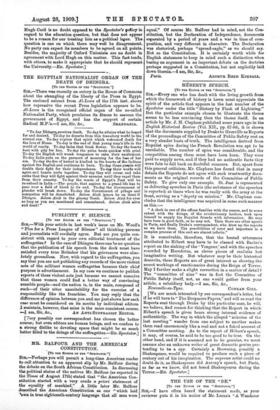WABERT'S SPEECH. [To THE EDITOR OF THE "SPECTATOR."] SIR,—Every one
who has dealt with the living growth from which the framework of history is hewn must appreciate the spirit of the article that appears in the last number of the Spectator under the title "history by Flash of Lightning." But the particular example chosen to illustrate the theme seems to be less convincing than the theme itself. In an article by Mr. J. H. Clapham published some years ago in the English Historical Review (Vol. XII., pp. 67-84), it is shown that the documents supplied by Drake to Grenville as Reports of the proceedings of the Committee of Public Safety rest on a very slender basis of truth. The intelligence derived from Royalist spies during the French Revolution was apt to be unreliable. The number of spies was considerable, and the competition among them must have been keen. They were paid to supply news, and if they had no authentic facts they were fain to fall back on doubtful rumours. But, apart from this general criticism, Mr. Clapham has found that in many details the Reports do not agree with such trustworthy docu- ments as the original records of the Committee of Public Safety. To give only one example. St. Just is represented as delivering speeches in Paris (the substance of the speeches is reported) at times when he was really with the army at the front, serving as a "deputy on mission." Mr. Clapham con-
cludes that the intelligence was acquired in some such manner as this :—
" A. clerk in one of the offices familiar with the names, and to some extent with the doings, of the revolutionary leaders, took upon himself to supply his Royalist friends with information. He may have been in good faith, or he may not. Then there are other agents in Paris, and finally Drake's correspondent, who drew up the reports as we have them. The possibilities of error and imposture in a complex process of this sort are almost infinite."
It is conceivable, therefore, that the heated utterances attributed to Hebert may have to be classed with Bai ere's report on the sinking of the Yengeur,' and with the speeches recorded by Herodotus, as clever pieces of realistic) but imaginative writing. But whatever may be their historical demerits, these Reports are of great interest as showing the secret workings of reactionaries during the Reign of Terror. May I further make a slight correction in a matter of detail ? The "committee of nine" was in fact the Committee of Public Safety itself, not, as one would gather from your article, a subsidiary body.—I am, Sir, &c.,
[We are much interested by our correspondent's letter, but if he will turn to " The Dropmore Papers," and will re-read the Reports sent through Drake by this particular man, he will, we believe, find reason for thinking that the Report in which Hebert's speech is given bears strong internal evidence of authenticity. The way in which the alleged "minutes of the last meeting" wander from one subject to another makes them read uncommonly like a real and not a faked account of a Committee meeting. As to the report of Haeres speech, it may, of course, be said to be too good to be true. On the other hand, and if it is assumed not to be genuine, we must assume also an unknown writer of great dramatic genius pre- tending to be a spy. Certainly a Browning, possibly a Shakespeare, would be required to produce such a piece of oratory out of his imagination. The supreme artist could no doubt do it, as Shakespeare did Antony's speech, but Paris, as far as we know, did not breed Shakespeares during the Terror.—ED. Spectator.]






































 Previous page
Previous page